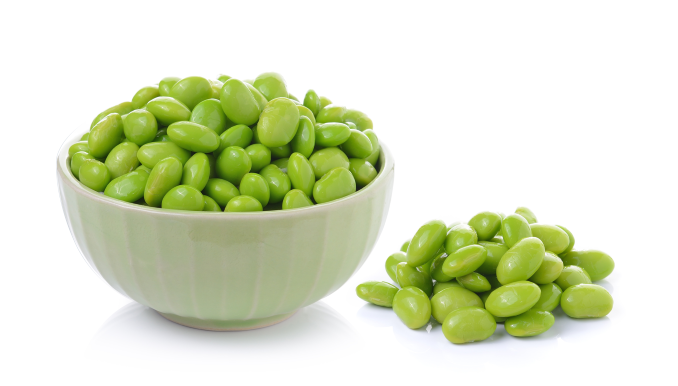Get the Facts About Soy
There is often confusion around soy and its impact on health and the environment as a result of both inaccurate and conflicting information; so we consulted registered dietitians at Johns Hopkins Center for a Livable Future, our scientific partners, to help set the record straight.
 The Takeaway on Soy
The Takeaway on Soy
Soybeans and healthy soy-based foods are rich in nutrients and beneficial plant-based compounds. It has been shown through scientific research that diets rich in minimally processed soy foods can provide health benefits, including improved heart health, lower risk of certain cancers, and improved cognitive function and memory.
Soy is a high quality source of protein with a digestibility score similar to meat and dairy, making it a great alternative to animal protein, especially red meat, as soy is low in saturated fat and cholesterol-free. Soy-rich foods provide healthy nutrients, such as B vitamins, iron and zinc, as well as antioxidants and fiber, which contribute to gastrointestinal health (or a healthy gut).
While soy-rich foods can be healthy, consuming minimally processed soy products, such as tofu, edamame and tempeh, are the best option.
Is it safe to eat soy (soybeans, tofu, and soy-based products)?
Yes. Soy is safe to consume and a great protein alternative source to meat. From a health perspective, choosing minimally processed soy products, such as tofu, tempeh, and edamame is preferred as compared to more highly processed soy products.
According to the Harvard School of Public Health, “soy is a nutrient-dense source of protein that can safely be consumed several times a week, and probably more often, and is likely to provide health benefits—especially when eaten as an alternative to red and processed meat.”
In 2017, the US Food and Drug Administration concluded that consuming 25 g/day of soy protein is safe[1]. Example day of eating 25 grams of soy protein.
Is soy a good source of protein and other nutrients?
Yes, soy is an excellent source of plant-based protein and is a complete protein, meaning it contains all the essential amino acids your body needs.
Additionally, soy provides many other nutrients such as B-vitamins, iron, zinc , calcium, fiber, potassium, and magnesium.
Soy protein and nutrient facts:
- Soy is higher in protein than other legumes.
- Soy protein has a digestibility and amino acid score similar to cow’s milk and egg proteins.
- Soy is low in saturated fat and provides healthy and essential fatty acids.
- The type of fiber in soy is considered to be prebiotic[2] and is approved by the FDA as a safe ingredient.
- Soy is also a good source of phytochemicals, which may provide desirable health benefits beyond basic nutrition to reduce the risk of major chronic diseases[3]
(Source: Healthline)
I’ve heard that soy has estrogen and can be harmful or ‘feminize’ men and boys. Is this true?
No, soy does not cause harm to men and boys. This misinformation has been circulating for a number of years, but studies have shown no significant findings between soy protein and reproductive hormones in men.[4] Soy contains isoflavones, a type of plant-based estrogen found in legumes, such as chickpeas and nuts. Isoflavones have many health benefits including supporting cellular health, improving immune and cognitive functions, and cholesterol lowering properties,[5] to name a few. Isoflavones are similar in structure to the hormone estrogen, but are processed differently by the body.
Does soy cause breast cancer?
No, soy does not cause breast cancer. In fact, studies suggest soy intake may reduce risk of breast cancer[6], especially when it is consumed regularly earlier in life during childhood.
Is soy formula harmful to babies?
No, soy-based formula is not harmful to babies. Soy-based infant formula is recognized as safe for healthy and full-term babies by the Academy of Pediatrics (APA).
However, the APA does not recommend soy formula for preterm infants or infants with food allergies during the first 6 months of life. More research is needed to assess safety and nutritional value for children under 24 months of age[7].
Is soy an antinutrient (aka, makes it more difficult for the body to absorb nutrients)?
Anti-nutrients are substances that have the ability to block the absorption of nutrients. They are naturally found in plant-foods as a defense mechanism and to reduce inflammation. These anti-nutrients effects are minimized through cooking and food preparation (soaking, sprouting, boiling, pairing with high calcium foods, steaming, and fermentation) and therefore does not significantly affect protein digestion. However, this is another area where more research is needed[8]. Lastly, in many cultures, soy is an essential part of the diet and has proven to have many health benefits.
Does eating soy cause thyroid problems?
Soy consumption does not appear to inhibit thyroid hormone production, however, more research is needed on this topic.
What are the health benefits of soy?
Diets that include healthy soy foods have been linked to many potential health benefits:
Reduced Risk of Heart Disease
Soy consumption has been positively correlated with lower LDL cholesterol levels, particularly in those with high cholesterol levels, and a reduced risk of cardiovascular disease[9]. The association of reduced cardiovascular risk is greater in East Asian populations than in Western populations[10]
Reduced Risk of Certain Cancers
Diets that are rich in soy have also been linked to a lower risk of certain cancers.
Prostate Cancer: Two studies that researched cancer in men with a clinically identified risk found a significant reduction in prostate cancer diagnosis for men who were given the soy/soy isoflavone intervention[11]
Breast Cancer: Epidemiologic and animal studies suggest that eating soy may reduce risk of breast cancer, especially if consumed in earlier years.
Alzheimer’s and Cognitive Function
Eating a diet rich in soy foods can also benefit memory and brain health. Soy’s antioxidant and anti-inflammatory effects may protect the brain tissues and nerve cells by improving synapse function and prevent Alzheimer’s disease[12]. Consumption of soy isoflavones have also been shown to improve cognitive function in adults, including men and post- and premenopausal women[13].
Does eating soy products like tofu and edamame harm the environment and cause deforestation?
No, eating soy products is not a significant contributor to deforestation. In fact, replacing red meat (beef) with plant-based proteins, such as soy, could help reduce deforestation. Over 70% of soy production is used for animal feed, while only a small amount of soy (6-7%) is actually eaten directly as food for humans.
Soybeans, like other legumes, are nitrogen fixers, which means they improve the soil and reduce the need for chemical fertilizers.
Learn more about plant-based protein and plant-based nutrition research from our technical partners at Johns Hopkins Center for a Livable Future.
[1] Food Labeling: Health Claims . Soy Protein and Coronary Heart Disease. A Proposed Rule by the Food and Drug Administration on 10/31/2017. Available online at: https://www.federalregister.gov/documents/2017/10/31/2017-23629/food-labeling-health-claims-soy-protein-and-coronary-heart-disease.
[2] Slavin, Joanne. “Fiber and prebiotics: mechanisms and health benefits.” Nutrients vol. 5,4 1417-35. 22 Apr. 2013, doi:10.3390/nu5041417
[3] Monika Thakur, Karuna Singh, Renu Khedkar, in Functional and Preservative Properties of Phytochemicals, 2020
[4] Hamilton-Reeves, J. M., Vazquez, G., Duval, S. J., Phipps, W. R., Kurzer, M. S., & Messina, M. J. (2010). Clinical studies show no effects of soy protein or isoflavones on reproductive hormones in men: results of a meta-analysis. Fertility and sterility, 94(3), 997–1007. https://doi.org/10.1016/j.fertnstert.2009.04.038
[5] C.W. Xiao, 22 – Functional soy products,In Woodhead Publishing Series in Food Science, Technology and Nutrition, Functional Foods (Second Edition), Woodhead Publishing, 2011,Pages 534-556. https://www.sciencedirect.com/science/article/pii/B9781845696900500229
[6] Takagi, A., Kano, M., & Kaga, C. (2015). Possibility of breast cancer prevention: use of soy isoflavones and fermented soy beverage produced using probiotics. International journal of molecular sciences, 16(5), 10907–10920. https://doi.org/10.3390/ijms160510907
[7] Verduci Elvira, Di Profio Elisabetta, Cerrato Lucia, Nuzzi Giulia, Riva Luca, Vizzari Giulia, D’Auria Enza, Giannì Maria Lorella, Zuccotti Gianvincenzo, Peroni Diego G.(2020)Use of Soy-Based Formulas and Cow’s Milk Allergy: Lights and Shadows. Frontiers in Pediatrics, 8 (1-11). https://www.frontiersin.org/article/10.3389/fped.2020.591988
[8] Petrosky W, Minich D., Is There Such a Thing as “Anti-Nutrients”? A Narrative Review of Perceived Plant Compounds. Nutrients. 2020 Oct; 12(10):2929.https://www.ncbi.nlm.nih.gov/pmc/articles/PMC7600777/
[9] Li, N., Wu, X., Zhuang, W., Xia, L., Chen, Y., Zhao, R., Yi, M., Wan, Q., Du, L., Zhou, Y., Soy and Isoflavone Consumption and Multiple Health Outcomes: Umbrella Review of Systematic Reviews and Meta-Analyses of Observational Studies and Randomized Trials in Humans. Mol. Nutr. Food Res. 2020, 64, 1900751. https://doi.org/10.1002/mnfr.201900751
[10] Ramdath, D. D., Padhi, E. M., Sarfaraz, S., Renwick, S., & Duncan, A. M. (2017). Beyond the Cholesterol-Lowering Effect of Soy Protein: A Review of the Effects of Dietary Soy and Its Constituents on Risk Factors for Cardiovascular Disease. Nutrients, 9(4), 324. https://doi.org/10.3390/nu9040324
[11] van Die, M. D., Bone, K. M., Williams, S. G., & Pirotta, M. V. (2014). Soy and soy isoflavones in prostate cancer: a systematic review and meta-analysis of randomized controlled trials. BJU international, 113(5b), E119–E130. https://doi.org/10.1111/bju.12435
[12] Lu, Y., An, Y., Lv, C., Ma, W., Xi, Y., & Xiao, R. (2018). Dietary soybean isoflavones in Alzheimer’s disease prevention. Asia Pacific journal of clinical nutrition, 27(5), 946–954. https://doi.org/10.6133/apjcn.052018.01
[13] Cui, C., Birru, R. L., Snitz, B. E., Ihara, M., Kakuta, C., Lopresti, B. J., Aizenstein, H. J., Lopez, O. L., Mathis, C. A., Miyamoto, Y., Kuller, L. H., & Sekikawa, A. (2020). Effects of soy isoflavones on cognitive function: a systematic review and meta-analysis of randomized controlled trials. Nutrition reviews, 78(2), 134–144. https://doi.org/10.1093/nutrit/nuz050


